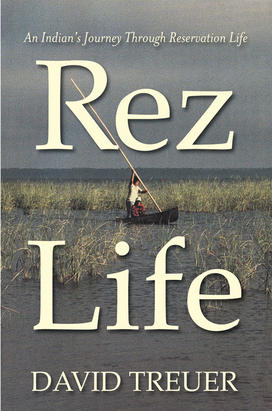
When David Treuer ’92 decided to write about life on reservations, he did not want his account to follow the same arc as most stories about Native Americans. In other words, he was not interested in writing a tragedy. Instead, he hoped to convey the “delicious and wonderful complexity” at the heart of the Native American story.
“Reservations aren’t places of deficit. This is how they’re usually seen — places where there is a lack of peace, a lack of health, a lack of money, a lack of opportunity,” says Treuer, an Ojibwe Indian and the author of three novels. “But I actually got to see them as places of surplus.”
Reservations do have higher rates of poverty than the rest of the country, Treuer says, but they also are home to tight-knit communities with a deep sense of history and tradition.

That reservations are places of more, not less, is the central insight of Rez Life (Atlantic Monthly Press), Treuer’s first nonfiction book. It took him years to articulate this idea, but Treuer says he felt it for most of his life.
Treuer grew up on the Leech Lake Reservation in Minnesota. He still lives there part time when he is not teaching literature and creative writing at the University of Southern California. Two events spurred him to write this book. The first was the 2005 school shooting on the Red Lake Reservation in Minnesota that left seven people dead. Both of his parents had worked at the school, and Treuer felt the need to give a fuller account of the story, one that went beyond tragedy.
Yet Treuer did not know how to tell that story until 2007, when his grandfather committed suicide. Treuer was asked to write the eulogy, and he felt a desperate need to see the event in a different way. After much reflection, he was able to say at the funeral that “all appearances to the contrary, [my grandfather] really got to live the life he wanted to live, in the place he wanted to live it, surrounded by the people he loved most,” he recalls. “In that, he was far luckier than most of us are.” In short, his grandfather’s life was a story of more, not less.
Treuer brought the same perspective to the writing of Rez Life. The book relies on a variety of individuals, some friends and family members, to examine various facets of Indian life. For example, writing about his mother, a tribal court judge, allowed Treuer to talk about the complicated story of Native American justice. Other chapters deal with treaty rights, the notion of sovereignty, and the surprising success of Indian casinos. He also writes about his brother, Anton Treuer ’91, with whom he is working to preserve the Ojibwe language; and the author’s friend, Sean Fahrlander, a colorful storyteller and expert fisherman. The book weaves in Treuer’s own story with a larger historical account of the Native American journey.
“The force of history is writ in people’s lives in very large letters on the reservation,” says Treuer. “You can see [it] very clearly when you know where to look.”
WHAT HE’S JUST READ: Hampton Sides’ Blood and Thunder
What he liked about it: “His profound love for the Southwest is almost overwhelming. When he starts talking about the mountains and deserts of New Mexico and Arizona, he just breaks free into this glorious prose.”










1 Response
Henry L. Bird ’50
8 Years AgoReservation experiences
It was good to read about David Treuer ’92 and his book (Alumni Scene, April 4). Having served Native Americans in Maine and New Mexico, it was of great interest. I also like Blood and Thunder!
I’ve written a memoir including our Native American experiences, Ride the Wind. It may be of interest — available through Amazon or bookstores. Among our reservation experiences was our work with Albuquerque Urban Indians and how important it was for returning periodically to their reservations.